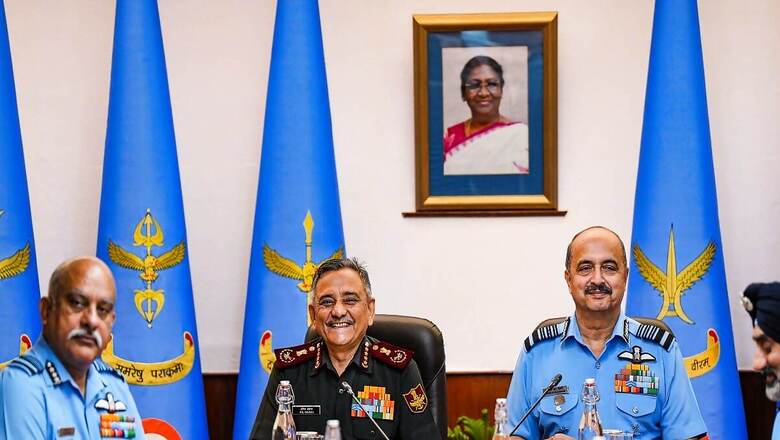
views
The government is pushing ahead with the Inter-Services Organisations (Command, Control and Discipline) Bill in Parliament, amid the ongoing preparations for the integration of Armed forces and speculation on the announcement of three integrated commands.
While presenting the Bill in Lok Sabha on Friday, defence minister Rajnath Singh said it is an important step towards “integration…between the three wings of our Armed Forces, so that they will be able to face the challenges of the future in a united and integrated manner”.
“I want to assure the House that this bill is an important step in the direction of military reforms. This bill does not include any additional financial implications,” he added. “It will also help create an environment that will strengthen discipline in our Inter-Services Organisations, he said.
The bill, which was introduced by the Ministry of Defence in March and recently received the recommendation of the Parliamentary Standing Committee, comprising 29 members from different political parties, aims to grant future theatre commanders the authority to wield disciplinary powers over personnel, irrespective of their services.
Under the current system, personnel of the Indian Army, Navy, and Air Force are governed, according to the provisions in their respective All India Service Acts. However, the proposed bill aims to centralise disciplinary powers for personnel serving in or attached to the ISO regardless of their parent service.
PROVISIONS IN THE BILL
The Inter-Services Organisation (Command, Control and Discipline) Bill, 2023 was introduced in Lok Sabha on March 15, 2023, and subsequently referred to the Standing Committee on Defence. After deliberations, the committee adopted the report without any modifications, including a recommendation pertaining to Tri-Service/Theatre Commands.
The bill empowers the Central government to constitute an Inter-Services Organisation, applicable to all personnel of the regular Army, Navy, and Air Force, and persons from other forces as notified by the Centre, serving in or attached to such organisations. The bill grants the Commander-in-Chief, Officer-in-Command, or any other specially empowered officer the disciplinary and administrative powers for maintaining discipline and proper discharge of duties, irrespective of the personnel’s parent service.
To maintain Command and Control in the absence of the Commander-in-Chief or Officer-in-Command, the officiating incumbent or the officer on whom the command devolves will also be empowered to initiate disciplinary or administrative actions over the service personnel within the Inter-Services organisation.
The bill’s underlying objective is to enhance efficiency and maintain discipline within Inter-Services Organisations. It also provides associated administrative powers to the officers. The Andaman and Nicobar Command’s challenges were cited as an example during discussions.
As of now, personnel from the three services serving in or attached to ISO are covered by the bill. However, an enabling provision empowers the Central government to extend the applicability of this bill, either partially or wholly, to any other force raised and maintained by the Centre through a notification. This could include agencies like the Coast Guard, ITBP, BSF, Assam Rifles, SSB, or others under the central government.
ANNOUNCEMENT OF THEATRE COMMANDS SOON
In parallel, there are indications of integrated theatre commands becoming a reality, with officials from the defence ministry hinting at the first two commands towards both Pakistan and China. According to sources, the initials theatre command may be announced in Jaipur, while subsequent in Lucknow. Additionally, a maritime theatre command in the south is also likely.
















Comments
0 comment